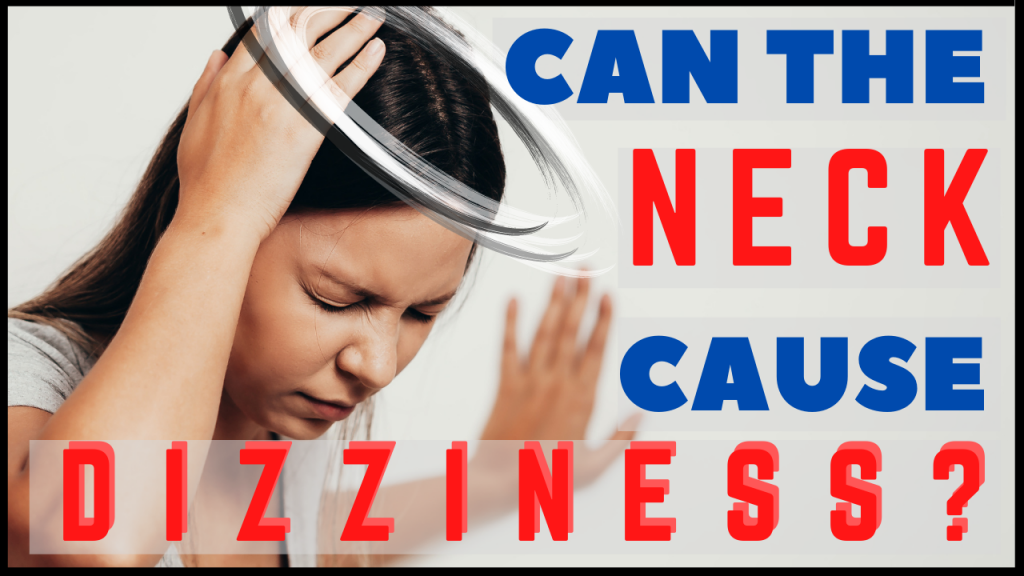Dizziness From the Neck?

More specifically, is your dizziness coming from your neck?
Dizziness or vertigo can be debilitating. I’ve seen it cause depression, anxiety, panic attacks, and it simply affects your quality of life. There are many things that can cause dizziness or vertigo. Cardiovascular issues – high blood pressure or low blood pressure? Problems in the inner ear, viral infections, vestibular migraines, allergies, vision problems, anxiety/stress, or Meniere’s disease can also cause dizziness or vertigo. These are just a few things that can cause dizziness or vertigo. One thing is certain. You need to find the cause of your problem.
Dizziness Feeling
In order to determine if the problem is coming from your neck, there are a few things that can help determine whether or not the cause is in your neck or somewhere else. One of the most important things you can do is determine what you feel like. Cervicogenic dizziness or cervical dizziness or cervical vertigo has a specific symptom pattern. Meaning one of the most common complaints of a cervicogenic dizziness patient will be a feeling of ‘lightheadedness’. The feeling could also be described as a ‘drunkenness’ state, feeling like you’re going to faint, a ‘fogginess’, feeling like you’re going to ‘fall over’, or postural imbalance. These are all symptoms or common complaints that we get when someone’s describing cervicogenic dizziness.
Another thing that can determine whether you have cervicogenic dizziness or not is, do you have neck pain? One thing that should to be associated with your unsteadiness is neck pain, neck stiffness, movement issues, or decreased range of motion. maybe sounds when you move your neck, that grinding sound. These are all common signs and symptoms.
Diagnosis by Elimination
Cervicogenic Dizziness is not an easy diagnosis. In fact, it’s a diagnosis by elimination. After you’ve ruled out infection, cardiovascular causes, inner ear problems such as BPPV, or the many other potential causes, the you can begin to assess whether the neck is involved.
Proprioception
With proprioception in the upper neck, there are mechanoreceptors that need to provide the right information back to the brain about your head position and movement for you to be able to maintain proper balance. These mechanoreceptors are in very high concentration in the upper part of your neck, especially in the suboccipital area, the area around CO C1 and C2. If these mechanoreceptors are injured or if they’re fatigued or if they’re inflamed, they will not do a good job at relaying the proper information back to the brain.
Other questions you should consider: have you had any previous trauma to your neck or head, a concussion, an old sports injury, even a car accident many, many years ago? Do you sit in front of a computer for long hours that will fatigue the mechanoreceptors in your neck? Do you know that you have forward head posture? Underlying neck arthritis? All of these things can help to qualify for a diagnosis of cervicogenic dizziness.
And finally, if you know you have cervicogenic dizziness and you’re struggling with it, be patient. This is a condition that takes time. Seek the professional opinion of a professional, like a chiropractor, who has experience in dealing with cervicogenic dizziness and upper cervical conditions.
Keep well,

P.S. Want a few things to try at home to help with your cervicogenic dizziness? Watch this video:
Chiropractic on Eagle
2:30 – 6:00 PMTuesday 7:30 – 10:45 AM
2:30 – 5:30 PMWednesday 2:30 – 6:00 PMThursday 7:30 – 10:45 AM
2:30 – 5:30 PMFriday ClosedSaturday ClosedSunday Closed
